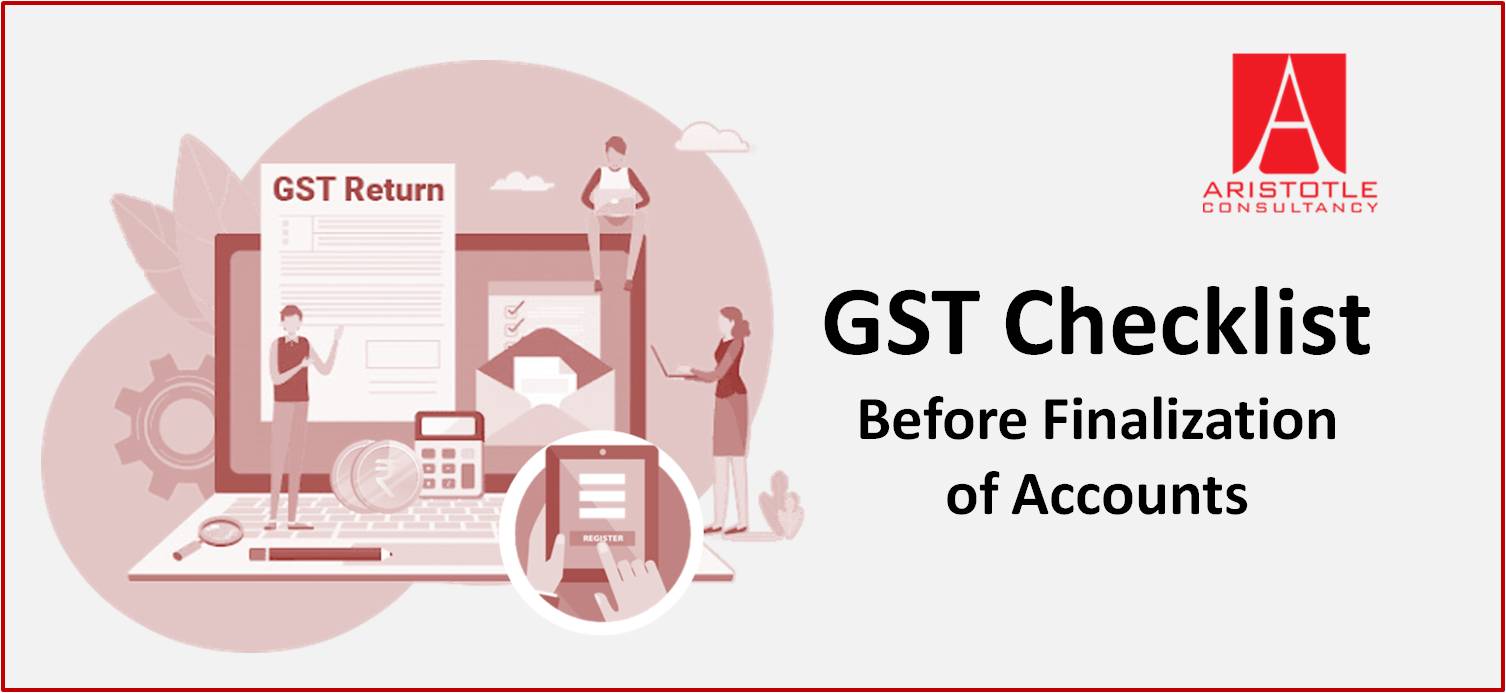Before issuance of the Audit Report, the auditor wants to confirm the accuracy of the Financial Statement. To provide a reasonable assurance that the Financial statement of such an organization gives a True & Fair view, for this purpose, there are many laws and legal points which are required to be considered. For this purpose, the auditor will also consider the provisions of GST, he will take the assurance that the financial statements are made as per the provision of GST or not. In this article, we will discuss the GST checklist and the considerations that are required to be considered before the finalization of Accounts (Profit & Loss Account, Balance Sheet)
- First, we will ensure that the person, who is registered under GST, has added and mention the HSN code of all the products and services in its GST Certificate. The HSN codes are very much useful for the person because on the basis of HSN code the person can know about the rate of GST on such particular product I.e. when he will enter the HSN code of any product then the GST rate of such product will automatically show.
- If the registered person supplying the goods and services within the state from the additional place of business, the auditor will check whether such additional place of business has been added in GST registration or not.
The above points (1 & 2), are the Preliminary checks. Now we will discuss GST considerations before finalization of P & L and Balance Sheet.
GST CHECKLIST BEFORE FINALISATION OF P & L ACCOUNT
Turnover
In the respect of Turnover, Reconciliation is required to be made, which will reconcile turnover as per books and as per return. On the basis of such reconciliation, we can find the difference in Turnover. In some cases, the differences arise due to the following reasons-
- The difference in Exchange Rate- In the books of accounts, we will record the amount of sale at the average transaction rate but in GST, the sale will be recorded at the rate which is notified under section 14 of the Customs Act. Due to this, there may be a difference in the amount of turnover/ sale.
- Stock Transfer- In the case of business when there is a stock transfer then it does not have any effect in our books of accounts but in GST, it is included in the amount of Turnover and on such transfer, GST is required to pay. Due to this, there may be a difference in the amount of turnover/ sale.
Samples for the sale promotion
In the case of business to increase the sale the person distribute some free samples. In the case of GST, it will not be considered as supply (outward supply) so the ITC which is claimed on such inward supply of such free samples will be reversed.
Classification of Goods
Under the GST, the goods are classified according to the HSN code and the rate of GST is determine on the basis of the HSN code of GST, so the HSN code should be correct. If there is any difference in the HSN code, it will change GST liability and differential GST liability is required to pay. So the classification of the goods should be proper.
Additional Place of Business
If the registered person supplying any goods or services from the additional place of business, such supply will also be added in the amount of Turnover.
Discount Allowed
If there is any discount allowed; it will reduce the GST liability so the auditor is required to verify it.
Related Parties Supply
If there is any related party supply; there are different valuation rules under GST. The auditor will check and verify the valuation.
Other Income
- The auditor will check all the transactions which are reported as ‘Other Income’. The auditor we check the applicability of GST on these transactions and if GST is applicable, will check whether Tax Invoice has been prepared or not.
- If there is any sale of fixed assets, the auditor will check whether ITC is availed or not. If ITC is not availed, the GST will be applicable to the transaction value. And if ITC is availed and the asset has been sold within the period of 5 years, the GST will be higher of the following-
- Transaction value which is determined as per section 15 multiple by GST rate which is applicable or
- The availed ITC, reversed by such % point as may be prescribed.
- Interest Income- On interest income, GST is not applicable but sometimes it should be added to the total amount of turnover as per section 2(6) of CGST Act 2017.
Expenses
- The auditor will check all the expenses and check RCM (Reverse Charge) liability.
- The auditor will check GST applicability on all the reimbursements.
- The auditor will check whether the ITC is availed on repair & maintenance as per section 17 (5) of CGST Act 2017.
- The auditor will also check the payment which is made to the director as director remuneration.
- The auditor will check the following expenses and ensure that ITC is not availed on such expenses
- Prepaid Expenses- In the case of prepaid expenses, the ITC can be availed only at the time of receipt of goods and services.
- Employee Benefit Expenses- On employee benefit expenses, ITC is not available.
- Personal Expenses- On personal expenses, ITC is not available. ITC is available only on those goods and services which are used for business purposes.
GST CHECKLIST BEFORE FINALISATION BALANCE SHEET-
- Inventory – In the case of inventory, the auditor will consider the following points-
- The registered person will claim the amount of ITC on the goods only when he has received such goods.
- In the respect of stolen goods, destroyed goods, the ITC is to be reversed.
- PPE (Property, Plant & Equipment) – The auditor will consider the following points in the respect of Property, Plant & Equipment-
- In the respect of PPE, ITC is not available (Block Credit).
- Depreciation cannot claim on the GST component.
- If there is any disposal of ant capital assets, GST is required to pay if ITC was claimed at the time of purchase of such capital assets.
- Trade Payable (Creditors) – In the respect of trade payable, the auditor will consider the following points-
- The payment should be made within 180 days from the date of invoice.
- If there is any transaction with the related party, the valuation should be made according to the valuation rule.
- Trade Receivable (Debtors)- In the respect of trade receivable, the auditor will consider the following points-
- If there is any transaction with the related party, the valuation should be made according to the valuation rule.
- In the case of export of services, the terms of receivable should be in foreign currency and it should be received within 1 year from the date of invoice.
- GST Balance- If the balance of ITC is more than the output tax liability, the balance shall be disclosed as a part of Current assets, and if GST liability is more than ITC then it shall be disclosed as Other Current Liability.






